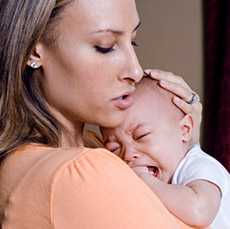Complications
On This Page
Español: Complicaciones
Babies and Children
Pertussis (whooping cough) can cause serious and sometimes deadly complications in babies and young children, especially those who have not received all recommended pertussis vaccines.
About half of babies younger than 1 year old who get pertussis need care in the hospital. The younger the baby, the more likely they will need treatment in the hospital. Of those babies who are treated in the hospital with pertussis about:

- 1 out of 4 (23%) get pneumonia (lung infection)
- 1 out of 100 (1.1%) will have convulsions (violent, uncontrolled shaking)
- 3 out of 5 (61%) will have apnea (slowed or stopped breathing)
- 1 out of 300 (0.3%) will have encephalopathy (disease of the brain)
- 1 out of 100 (1%) will die
Teens and Adults
Teens and adults can also get complications from pertussis. They are usually less serious in this older age group, especially in those who have been vaccinated with a pertussis vaccine. The cough itself often causes complications in teens and adults. For example, you may pass out or break (fracture) a rib during violent coughing fits.
In one study, less than 1 out of 20 (5%) teens and adults with pertussis needed care in the hospital. Healthcare professionals diagnosed pneumonia (lung infection) in 1 out of 50 (2%) of those patients. The most common complications in another study were:
- Weight loss in 1 out of 3 (33%) adults
- Loss of bladder control in 1 out of 3 (28%) adults
- Passing out in 3 out of 50 (6%) adults
- Rib fractures from severe coughing in 1 out of 25 (4%) adults
References
- Cortese MM, Bisgard KM. Pertussis. In: Wallace RB, Kohatsu N, Kast JM, ed. Maxcy-Rosenau-Last Public Health & Preventive Medicine, Fifteenth Edition. The McGraw-Hill Companies, Inc.; 2008:111–14.
- National Notifiable Diseases Surveillance System, 2004–2014. Division of Integrated Surveillance Systems and Services, National Center for Public Health Informatics, Coordinating Center for Health Information and Service, Centers for Disease Control and Prevention, U.S. Department of Health and Human Services, Atlanta, GA 30333.
- Tanaka M, Vitek CR, Pascual FB, Bisgard KM, Tate JE, Murphy TV. Trends in pertussis among infants in the United States, 1980-1999. JAMA. 2003;290:2968–75.
Related Pages
- Page last reviewed: August 7, 2017
- Page last updated: August 7, 2017
- Content source:


 ShareCompartir
ShareCompartir